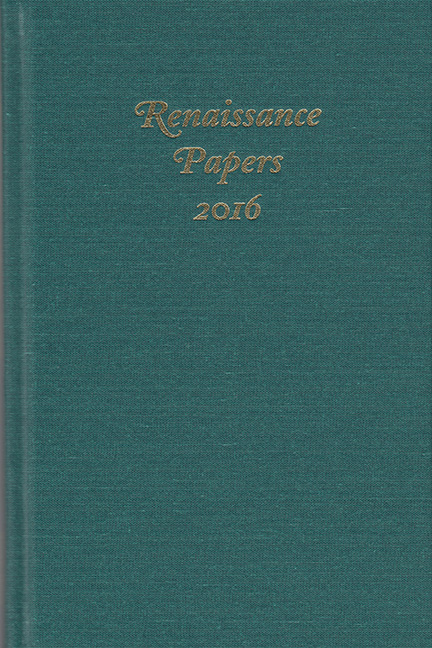Book contents
- Frontmatter
- Contents
- Renaissance Papers
- Beyond Recognition: Mutilation, Marginalia, and the Vicissitudes of Reading
- Velázquez as Reader and the Pictor Doctus in Early Modern Spanish Art
- “Out of this silence yet I picked a welcome”: The Audience in A Midsummer Night's Dream
- Uncommon Justice: The Secret Knowledge and Sagacious Judgment of Old Escalus
- Boundaries in a Globalized World: Shakespeare's Antony and Cleopatra
- Imitation, Innovation, and Imperium: The Grammar School Education of Lear's Daughters
- Violent Brothers, Deadly Antifeminism, and Social Suicide in The Revenger's Tragedy and The Duchess of Malfi
- Canon Fodder: Notes on Don Quijote
Uncommon Justice: The Secret Knowledge and Sagacious Judgment of Old Escalus
Published online by Cambridge University Press: 23 August 2019
- Frontmatter
- Contents
- Renaissance Papers
- Beyond Recognition: Mutilation, Marginalia, and the Vicissitudes of Reading
- Velázquez as Reader and the Pictor Doctus in Early Modern Spanish Art
- “Out of this silence yet I picked a welcome”: The Audience in A Midsummer Night's Dream
- Uncommon Justice: The Secret Knowledge and Sagacious Judgment of Old Escalus
- Boundaries in a Globalized World: Shakespeare's Antony and Cleopatra
- Imitation, Innovation, and Imperium: The Grammar School Education of Lear's Daughters
- Violent Brothers, Deadly Antifeminism, and Social Suicide in The Revenger's Tragedy and The Duchess of Malfi
- Canon Fodder: Notes on Don Quijote
Summary
STEPHEN Greenblatt asserts that “the topical significance of a play depends in large measure on the particular moment in which it is performed, and on certain features of the performance— for example, a striking resemblance between one of the characters and a well-known public figure.” If he is correct, then we should not be surprised that when someone paid the Lord Chamberlain's men to “revive their old play about the deposition and murder of Richard II,” on the very “day before the Earl of Essex's attempted coup against Queen Elizabeth in 1601,” the astute and furious monarch would declare, “I am Richard II. Know ye not that?” James Stuart, of course, the most famous auditor at the December 26, 1604, performance of Measure for Measure, did not publicly claim identity with any of the characters in the play, though its subsequent performance history suggests that he had a decided private reaction to what he saw and heard that day. If, as several critics suggest, Shakespeare purposefully comments on the newly crowned king of England in the play, James may well have had good reason to be at least bemused. Opinions differ, though, as to what exactly these comments are, and what their intended purpose is. Carolyn Brown observes that, while some scholars “interpret the play and its main character as a tribute to James and his conception of government,” others “suggest that [Shakespeare] may be counseling or educating his king on proper governing procedures.” But these two opinions need not be mutually exclusive, for, as Brown herself notes, “several critics have attempted to decode the play and to detect the covert criticism of James and monarchy hidden under a surface meaning that Shakespeare meant to please the king and his supporters.” Although Shakespeare's criticism of the king in the play may be covert, his counsel to the king is not, coming through the often overlooked figure of Lord Escalus, the sagacious counselor to both Duke Vincentio and Angelo.
Escalus, though arguably wise in this play, is a stock character, the type of character that Paul Cantor suggests is “found standing in the background of a play, futilely counseling the other characters to rein in their foolish but dramatically exciting passions.”
- Type
- Chapter
- Information
- Renaissance Papers 2016 , pp. 49 - 68Publisher: Boydell & BrewerPrint publication year: 2017

